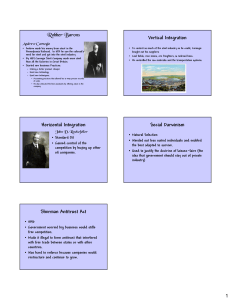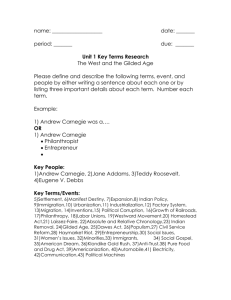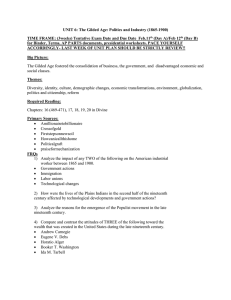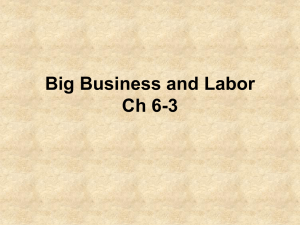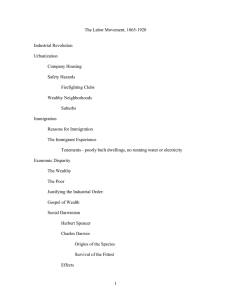Document 17613981
advertisement
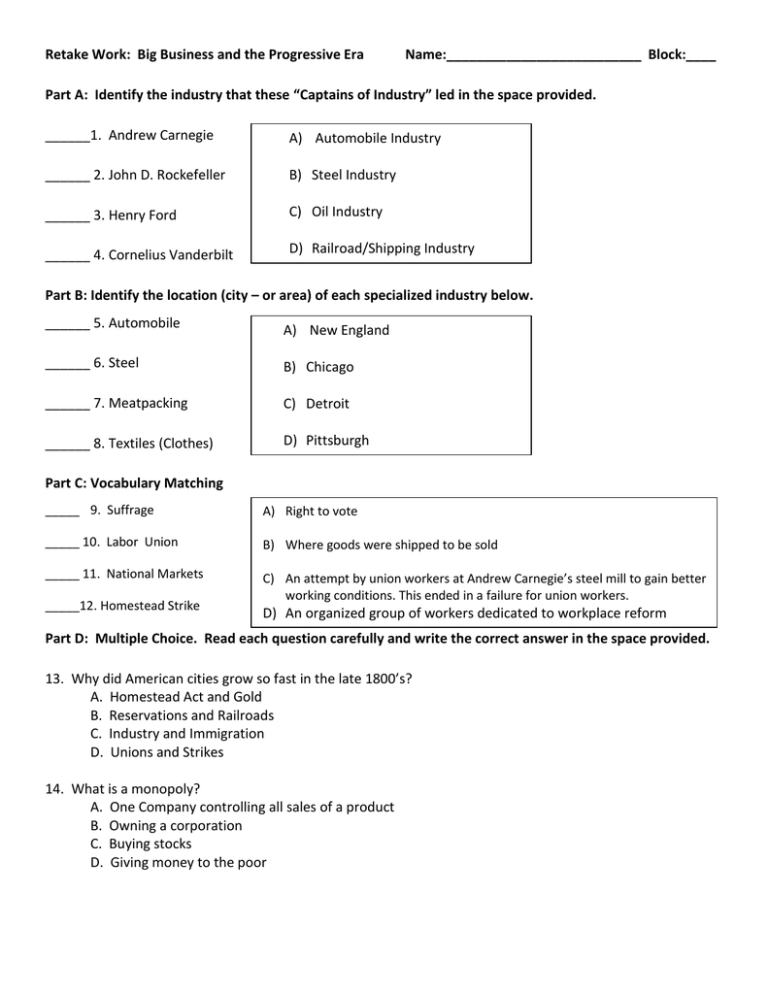
Retake Work: Big Business and the Progressive Era Name:__________________________ Block:____ Part A: Identify the industry that these “Captains of Industry” led in the space provided. ______1. Andrew Carnegie A) Automobile Industry ______ 2. John D. Rockefeller B) Steel Industry ______ 3. Henry Ford C) Oil Industry ______ 4. Cornelius Vanderbilt D) Railroad/Shipping Industry Part B: Identify the location (city – or area) of each specialized industry below. ______ 5. Automobile A) New England ______ 6. Steel B) Chicago ______ 7. Meatpacking C) Detroit ______ 8. Textiles (Clothes) D) Pittsburgh Part C: Vocabulary Matching _____ 9. Suffrage A) Right to vote _____ 10. Labor Union B) Where goods were shipped to be sold _____ 11. National Markets C) An attempt by union workers at Andrew Carnegie’s steel mill to gain better working conditions. This ended in a failure for union workers. _____12. Homestead Strike D) An organized group of workers dedicated to workplace reform Part D: Multiple Choice. Read each question carefully and write the correct answer in the space provided. 13. Why did American cities grow so fast in the late 1800’s? A. Homestead Act and Gold B. Reservations and Railroads C. Industry and Immigration D. Unions and Strikes 14. What is a monopoly? A. One Company controlling all sales of a product B. Owning a corporation C. Buying stocks D. Giving money to the poor 15. How did advancements in transportation help make businesses big? A. Linked resources to specialized industries to national markets B. Air pollution decreased C. Cattle drives got longer and more dangerous D. People shipped more goods by canals 16. By using the most modern machinery and purchasing raw materials in bulk, companies could produce large amounts of goods at low cost known as _________________________. A. division of labor. B. standardization of parts. C. mass production. D. Sears and Roebuck. 17. What did the industries need in order to create products to send to the national markets? A. workers B. raw materials C. financial resources D. all of the above 18. Manufacturers could produce large quantities of goods more quickly and products could be sold more cheaply (mass production) with the invention of the ____________________. A. Model T. B. assembly line. C. light bulb. D. telegraph. 19. Political machines were corrupt (bad) in all of the following ways EXCEPT: A. They helped immigrants get jobs and houses. B. They used bribes to obtain votes. C. They illegally influenced elections. D. They used fraudulent contracts to get kickbacks. 20. Why is Boss Tweed sure that no one will do anything to stop him? A. People like him so much. B. He controls the police and the courts. C. He will crush his enemies with his weight. D. He will escape to China. 21. What was the purpose of the "Progressive Era"? A. to correct many of the problems in America B. to settle problems caused by the Civil War C. to prepare for the coming of war D. to give the Native Americans their land back 22. Susan B. Anthony and Elizabeth Cady Stanton were women who fought for_______. A. Banning child labor B. Reducing Political Machines C. Banning the sale of alcohol D. Women’s suffrage 23. Which Amendment to the Us Constitution granted women the right to vote? A. 15th B. 19th C. 26th D. 27th 24. How did workers "fight" for better working conditions? A. Workers slacked off until they got their way B. Workers told the government C. Workers just quit their jobs D. Workers formed unions and held strikes 25. The American Federation of Labor (AFL) was a famous________. A. Strike B. Union C. Tenement D. Settlement House 26. Hull House was a famous___________. A. Strike B. Union C. Tenement D. Settlement House 27. All of these were negative effects of industry except: A. Long work hours B. Low Pay C. Child Labor D. More jobs 28. Who founded Hull House? A. Samuel Gompers B. Jane Addams C. Andrew Carnegie D. Boss Tweed 29. What term was created to describe journalists who exposed the evils of industry? A. Dirtrakers B. Muckrakers C. Sweepers D. Wrongdoers 30. Boss Tweed was the leader of a __________ in New York City. A. Political Machine B. Labor Union C. Steel Factory D. Settlement House
